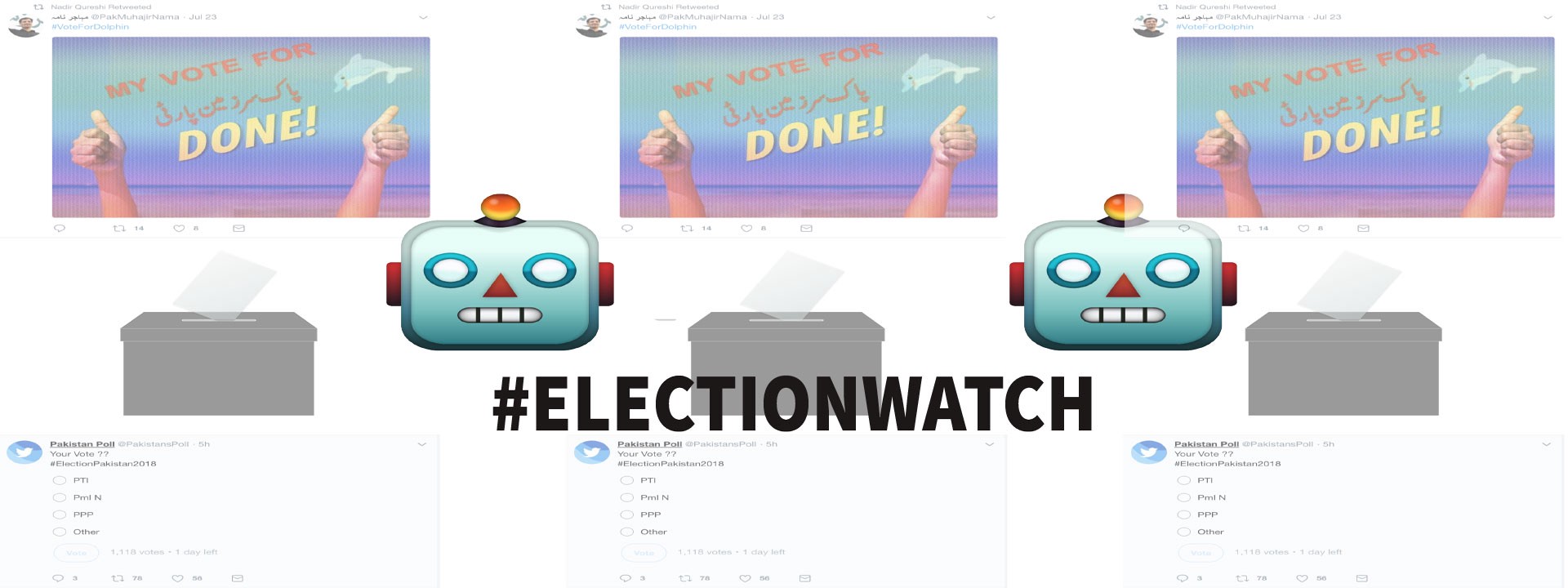#ElectionWatch: Bots and Biased Polls in Pakistani Elections
Parties across the spectrum used automation to amplify messages ahead of the vote
#ElectionWatch: Bots and Biased Polls in Pakistani Elections

Parties across the spectrum used automation to amplify messages ahead of the vote

Ahead of the Pakistan elections on July 25, artificial trending and biased opinion polls circulated on Twitter as political parties and their supporters sought an edge online.
With 342 seats up for grabs, the Pakistan Muslim League (N) and Pakistan Tehreek-e-Insaf are leading the opinion polls, while Pakistan People’s Party is slightly behind the margin.
One of the PML (N) candidates, Chaudhry Riaz-ul-Haq, running for the NA-142 constituency in East Punjab, ran a Twitter campaign: #NA142RIAZKA. @DFRLab gathered evidence of probable bots pushing the campaign.
The hashtag began circulating on Twitter on June 19, and gathered 3,144 mentions (tweets and retweets) in two days. All those mentions came from just 22 accounts, with an average of 142 mentions per account. This was uncharacteristic of organic traffic, where an average of two posts per user would be normal.
According to an analysis conducted with the Sysomos online suite of tools, 2,876 out of 3,144 mentions were retweets, which roughly translates to a proportion of 91.5 percent. This, again, was such a high figure that it suggested automatic amplification.

The trending was initiated by 22 accounts, of which 17 were created in June 2018. The span of account creation was so short that it reinforced the impression that these accounts were created for the purpose of amplifying the hashtag.

The tweets were deleted, but @DFRLab archived a list of the tweets and profiles that retweeted campaign. The screenshots show how the trending took place, with multiple mentions in the same order.



To give a clear understanding of what a small, interconnected, retweeting bot network looks like, we made a visualization. This visualization gives a clear picture of how these bots retweeted each other massively to artificially trend the hashtag in support of the PML (N) candidate.

Bot-like accounts promoted other parties’ slogans too. Again, using Sysomos, @DFRLab analyzed the hashtag #VoteForMML, which was used by the Milli Muslim League (MML). In April, the political party was designated as a terror outfit by the U.S. Department of the Treasury because of it’s function as a front for the Lashkar-e Tayyiba group, which was designated a terrorist group by the United States in December 2001 after it attacked Indian Parliament. The group is also well known for a 2008 attack on five landmarks in Mumbai, which killed 166 people.

#VoteForMML had a reach of 5.5 million impressions in a week. Again, the number of tweets per user was far higher than would be characteristic of organic traffic, at about 31.5 tweets per user. The statistics by Sysomos show cyborg-like behavior of some accounts. Duplicate posting by several newly created accounts rigged the campaign.

In another case, the Pak Sarzameen Party campaign #VoteForDolphin reached 11.2 million users, but with bot-like accounts pushing it. The campaign had an average of 21 posts per user.

On this occasion, Twitter’s algorithm appeared to have detected fake amplification in the campaign #VoteForDolphin, and temporarily restricted the visibility of the accounts. The warning message on the accounts read, “there has been some unusual activity;” this warning is often the precursor to a bot account being suspended.


Most of these flagged bots were created in July 2018, just before the elections, and one of the flagged bot-like accounts used an image of Kevin McLaughlin, a reporter at The Information.

Twitter Polls
Online political opinions can be swayed by manipulating information or by showing false data metrics to show which party has the higher number of votes. The Pakistani internet featured some 14 unofficial Twitter polls; ahead of the election, many appeared to be posting biased results.
Out of these, the most influential was @PakistansPoll, which claimed to be the official poll of Pakistan Twitter, and states “Love & Support for Pakistan and Pak ARMY.” The account itself appeared to be heavily biased. From the account was created in December 2015, to June 21, 2018, about 30 percent of the retweets it posted were of tweets from the PTI and its leader Imran Khan; no other party received such favorable treatment. Continuous retweets and mentions Imran Khan’s campaign depict the page seemed to favor one party’s stance over others.
Here’s a list of tweets scraped from the profile.

The screenshot shows a tweet against Nawaz Sharif shared by @PakistansPoll from a PTI supporter. The profile had no tweeting activity after 2016, but suddenly in March 2018, the profile started running polls which mostly showed the PTI as the leading party.
As highlighted by Mediashift, Twitter polls about politics can become a big problem as the polls can amplify people’s biases. As in Pakistan, India noticed a similar problem with a Twitter polling account called @myvotetoday, which was suspended from Twitter for posting biased polls.
Conclusion
This report illustrates, once again, how election campaigns in the social media space can be rigged, and how manufactured trending in Pakistan worked. As in an increasing number of countries, Pakistan’s media and analytical communities have conducted some bot and automation research; nevertheless, the telltales of artificial traffic are clear in several Twitter flows.
@DFRLab will continue to monitor the fake automation and false information space in Pakistan around the general elections period.
Follow along for more in-depth analysis from our #DigitalSherlocks.

